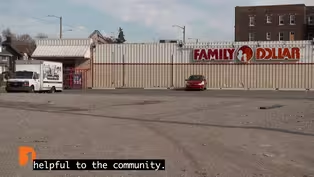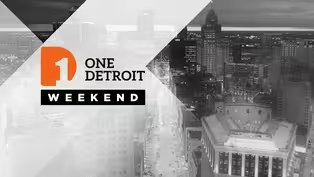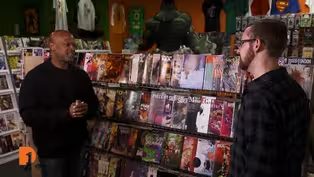
College prison programs prepare returning citizens for work
Clip: Season 8 Episode 23 | 8m 18sVideo has Closed Captions
Two Michigan college prison programs help prepare returning citizens for the workforce.
In Michigan, roughly 22% of the state’s formerly incarcerated population end up back behind bars, but education can have an impact on recidivism. One Detroit contributor Mario Bueno and senior producer BIll Kubota explore how two Michigan prison education programs are helping the incarcerated prepare for jobs when they’re released.
Problems playing video? | Closed Captioning Feedback
Problems playing video? | Closed Captioning Feedback
One Detroit is a local public television program presented by Detroit PBS

College prison programs prepare returning citizens for work
Clip: Season 8 Episode 23 | 8m 18sVideo has Closed Captions
In Michigan, roughly 22% of the state’s formerly incarcerated population end up back behind bars, but education can have an impact on recidivism. One Detroit contributor Mario Bueno and senior producer BIll Kubota explore how two Michigan prison education programs are helping the incarcerated prepare for jobs when they’re released.
Problems playing video? | Closed Captioning Feedback
How to Watch One Detroit
One Detroit is available to stream on pbs.org and the free PBS App, available on iPhone, Apple TV, Android TV, Android smartphones, Amazon Fire TV, Amazon Fire Tablet, Roku, Samsung Smart TV, and Vizio.
Providing Support for PBS.org
Learn Moreabout PBS online sponsorship(gentle music) - Muskegon, west Michigan.
I'm catching up with Richard Rodriguez, convicted of second degree murder.
We were in prison together a few decades ago.
71 years old.
You did 39 years in prison.
What year was it when you went to prison?
- 1982.
- You've been now experiencing prison reentry for a year and a half.
How do you feel?
- Well it's different being out, modern technology has changed for me.
I'm just blending in right now, trying to make ends meet.
I'm going to school right now.
I'm in college.
I'm taking up nursing.
I've just been certified by the Red Cross to assist the elderly and handicapped.
I'm taking it little by little because I can't jump into a lot of things because a lot of things do surface up.
- Rodriguez wasn't much into education until he went to prison.
He took as many classes as he could.
Then came President Clinton's war on crime.
Harsher sentences grew prison populations and killed federal Pell grants for the incarcerated.
What were your thoughts when they took the Pell Grant back in 94?
- There's nothing I can say.
I couldn't whine and complain about it, they do what they do, you know.
- [Mario] Professor Richard Rays at Hope College in Holland, he knows about that.
He's working with prisoners trying to get college degrees.
- That redlined incarcerated students out of Pell eligibility and the number of college and prison programs in the United States of America dropped to eight after that.
- Dropped to eight?
The number of-- - Yes, eight.
- In the 90s, hundreds of programs simply vanished.
Imagine all the prisoners who lost that opportunity, but still, some are getting that chance.
We're at Fresh Coast Alliance in Muskegon, a training center for people in recovery.
Michael Duthler leads a class called Managing Relapse.
He came out of prison five years ago after 26 years.
A drug addict who committed second degree murder.
Could you have ever imagined doing what you're doing now?
- No way, 19-year-old me had no self-esteem, had no self-worth.
- At the Handlon Correctional Facility in Ionia, Duthler began college through Calvin University in Grand Rapids.
The Calvin Prison Initiative started in 2015.
You were educated and received, what'd you receive?
- Before I left In 2018, I was able to complete an Associate's degree, and then I completed a social work degree at the main campus in 2020.
- [Mario] Calvin relies on donors, a theological approach inspired by a prison program in Louisiana.
Duthler brings his study of faith and leadership along with his life experience to his work.
- Let's go out for dinner, absolutely.
But because I'm in recovery, I need to go a place that does not serve alcohol and just kind of create a boundary around that.
- What would you tell those who oppose such programming for, with all due respect, for murder?
- Sure.
Absolutely.
So one argument I would make is simply that from an economic standpoint, there's been studies that have shown that for every dollar you spend on education in prison, you're saving five for the cost of incarceration.
As they're continuing education, once they're in, recidivism rates drop.
- [Mario] Recidivism, re-offending, returning to prison, Michigan reports a recidivism rate at 22%.
But education can reduce that number.
One study shows that recidivism rate drops to less than 14% with an Associate's degree down to 5.6 with a Bachelor's degree, hitting zero with a Master's degree.
- I think a lot of that has to do with upward mobility, the opportunities that are available through an education.
But I'm also gonna make a case that it's that formative effective education so that you're able to see yourself through more than just the worsening that you've done in life.
You're able to see hope.
You're able to understand possibility, you're able to understand life differently for sure.
- [Mario] A few minutes away, you'll find another college and prison program at the Muskegon Correctional Facility.
- It's a journey, but every day, I'm improving myself in the best way I can.
- [Mario] Rene Rodriguez, a first degree murder lifer.
I knew him too back in my prison days.
He's also a Calvin University graduate.
Statistically, there's little chance he'll ever get out.
But now he's a tutor with the Hope Western Prison Education Program.
- I'm a first generation college graduate, and considering when I first entered the prison system, I could barely read and write, obtaining my college degree gave me a sense of achievement.
And at the same time, it built my level of confidence.
I would say that my college degree is an indication of my transformation.
- [Mario] Hope College and Western Theological Seminary started the program in 2019.
The Hope and Calvin programs believe educating prisoners like Rene is worth it.
- He is a servant leader and he has now been trained with our BA program to serve in the area of academics, peer mentoring, and ministry.
- Thank you Dr. Ray.
- [Mario] Hope's Richard Ray.
He's making the rounds.
It's an informal session.
Students at work like a college classroom you might find anywhere.
- The average Hope College student at Muskegon Correctional Facility is 47 years old.
We enroll and are interested in admitting into our program men with long sentences.
How about orientation?
How's that going?
We want and believe and think that there's good evidence for our students as they become sort of transformed by their own education, serving as exemplars for the rest of their peers.
- As it relates to behavior, do you see a difference?
- Yes, and I see a difference, oftentimes when people think about that question, they only think about the difference when somebody gets out of prison.
And we do see that difference.
But there's also a community that exists in facilities like this, and we see the impact here as well.
- This is a community of 1,294 prisoners with 250 staff.
This is a community.
We want the same thing in here that you want in society.
And the education program most definitely assists with that.
- We think when you educate even a small portion of a prison population, violence in the prison goes down.
- [Mario] Now there's news.
This past July, Federal Pell Grants are available again for the incarcerated.
- This is a game changer.
Across the country, we could see three quarters of a million people go back to college who were incarcerated, and those people are very unlikely to return to prison once they're released.
- To the average person who has no direct contact with the prison system, who's struggling to pay for college, what would you tell them?
- If you're in prison, it's very likely, almost overwhelmingly true, that you're a member of a marginalized or minority group.
And so if we want a more equitable society, you've gotta be concerned about raising all those boats.
- What the Pell Grants are gonna do for other universities and colleges is gonna allow them to start.
Maybe they don't have the kind of donor base we have.
That's gonna allow then a lot of colleges and universities to really imagine that this is possible.
- [Mario] Meanwhile, for Calvin and Hope, the Pell Grants will help, but the fundraising continues.
Professor Richard Ray talks about his list of benefactors.
- You'd run your finger down the page and you'd say, oh, that person's pretty liberal, holds liberal views and so forth.
And then you'd run your finger down the page a little further.
You'd say, wow, this person is like the most conservative person I've ever met.
And they all see the value in this.
- 95% plus the people who are in prison are gonna return to the community someday.
So we wanna make that investment in them.
And so it's not diminishing what they did, but it's helping to ensure they don't do it again.
- Incarceration alone is not enough to uproot criminal behavior.
People need education.
I would say that my college degree is an indication of my transformation, a sort of a renewal of my mind in the way I think, the way I carry myself.
I would say that it shaped who I am now as the person that I'd like to be.
Detroit Councilmember calls for moratorium on dollar stores
Video has Closed Captions
Clip: S8 Ep23 | 4m 40s | A Detroit councilmember calls for a moratorium on new dollar stores because of blight. (4m 40s)
One Detroit Weekend: December 8, 2023
Video has Closed Captions
Clip: S8 Ep23 | 1m 54s | See what holiday events are coming up around metro Detroit on “One Detroit Weekend.” (1m 54s)
Rob Edwards discusses his new graphic novel ‘Defiant’
Video has Closed Captions
Clip: S8 Ep23 | 6m 35s | Rob Edwards’ new graphic novel details a little-known story in America’s Black history. (6m 35s)
Providing Support for PBS.org
Learn Moreabout PBS online sponsorship
- News and Public Affairs

Top journalists deliver compelling original analysis of the hour's headlines.

- News and Public Affairs

FRONTLINE is investigative journalism that questions, explains and changes our world.












Support for PBS provided by:
One Detroit is a local public television program presented by Detroit PBS


